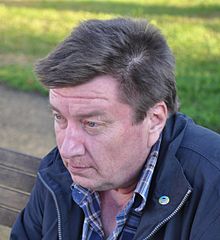Aki Kaurismäki
| Aki Kaurismäki | |
|---|---|

Aki Kaurismäki in 2012
|
|
| Born |
Aki Olavi Kaurismäki 4 April 1957 Orimattila, Finland |
| Occupation | Film director, producer, editor and screenwriter |
| Awards |
Cannes Grand Prix 2002 The Man Without a Past Cannes Ecumenical Jury Special Mention 1996 Drifting Clouds Cannes Prize of the Ecumenical Jury 2002 The Man Without a Past FIPRESCI Award 2011 Le Havre Jussi for Best Film 2006 Lights in the Dusk Jussi for Best Debut Film 1983 Crime and Punishment Jussi for Best Script 1983 Crime and Punishment 1996 Drifting Clouds 2002 The Man Without a Past 2011 Le Havre Jussi for Best Direction 1990 The Match Factory Girl 1992 La vie de bohème 1996 Drifting Clouds 2002 The Man Without a Past São Paulo Audience Award for Best Feature 1996 Drifting Clouds |
Aki Olavi Kaurismäki (Finnish: [ˈɑki ˈkɑurismæki]; born 4 April 1957) is a Finnish screenwriter and film director.
After graduating in media studies from the University of Tampere, Aki Kaurismäki started his career as a co-screenwriter and actor in films made by his older brother, Mika Kaurismäki. Together they founded the production company Villealfa Filmproductions and later the Midnight Sun Film Festival. His debut as an independent director was Crime and Punishment (1983), an adaptation of Dostoyevsky's novel set in modern Helsinki. He gained worldwide attention with Leningrad Cowboys Go America (1989). In 1989 he emigrated with his wife to Portugal, saying "in all of Helsinki there is no place left where I could place my camera".
Kaurismäki has been influenced by the French directors Jean-Pierre Melville and Robert Bresson, and some critics have also inferred the influence of Rainer Werner Fassbinder, although Kaurismäki has said that he somehow never got around to seeing any of Fassbinder's films until quite recently.
His movies have a humorous side that can also be seen in the films of Jim Jarmusch, who has a cameo in Kaurismäki's film Leningrad Cowboys Go America. (Jarmusch used actors who have appeared frequently in Kaurismäki's films in his own film Night on Earth, part of which takes place in Helsinki.) He has been called an auteur, since he writes, directs, produces and usually edits the films himself, and thus introduces his personal "drollery and deadpan" style. The dialogue is famously laconic: the articulation is usually extremely unadorned, direct and in strict standard language, without showing much emotion or drama. Characters usually stand still and recite the dialogue like it consisted of eternal truths. His characters rarely smile, nod sadly and usually expect the worst, and often smoke constantly. The camera is usually still. Events are shown in a plain manner and characters are usually left alone facing the consequences.
...
Wikipedia
